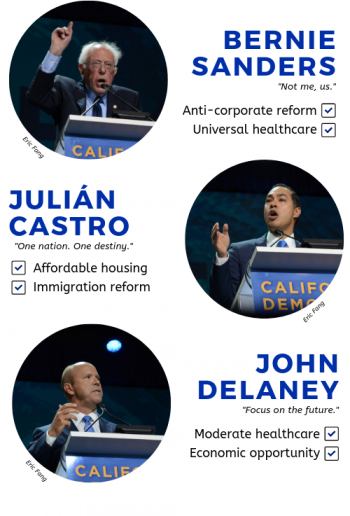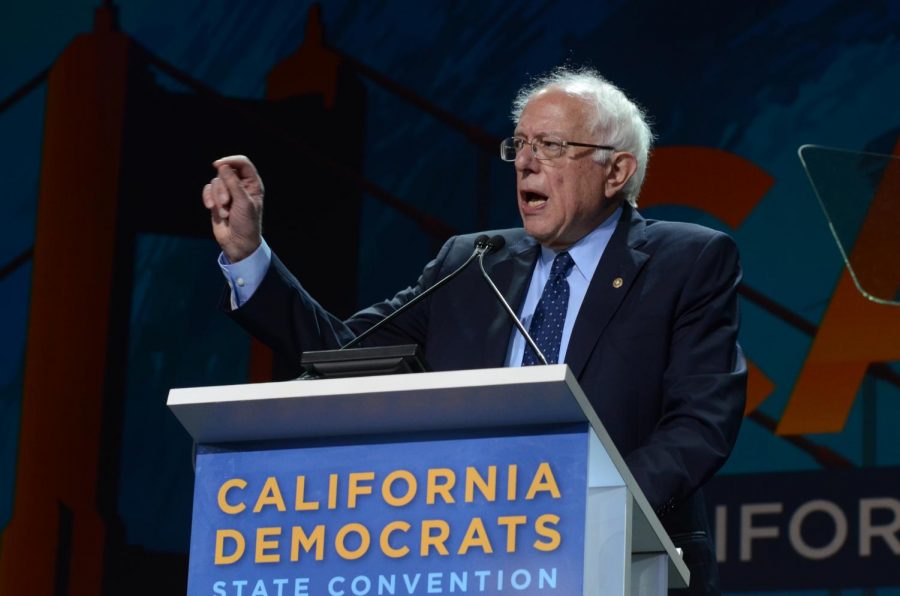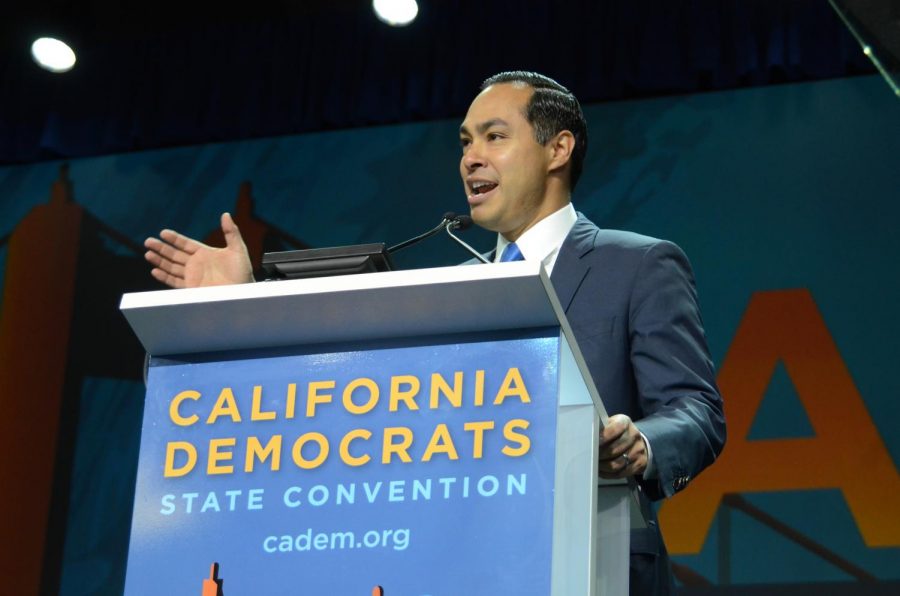Sanders, Castro and Delaney join Democratic presidential candidates at CDP
June 2, 2019
Several hundred California Democrats gathered for a final day of speeches, caucuses and workshops at the California Democrats’ State Convention, held in the Moscone Center of San Francisco. Today featured presidential candidate speakers Sen. Bernie Sanders, D-V.T., former Secretary of Housing and Urban Development Julian Castro and former Maryland U.S. House Representative John Delaney.

Sanders kicked off today’s lineup with a speech that was centered around the phrase “no middle ground,” connecting his self-described democratic socialist platform to a call for generational change. Among Sanders’ notable stances are a single-payer universal healthcare system, anti-capitalist economic policies and taxes, environmental protection, drug industry reform and a clean energy system that, as Sanders said in his speech, “represents all of us, not just the one percent.”
“We have got to make it clear that when this country drift towards oligarchy, there is no middle ground,” Sanders said in his address during the session. “Large profitable corporate companies like Amazon will pay their fair share of taxes.”
Sanders’ stance reflects a shift towards anti-corporate economic policies among Democrats across the nation, and during a brief open-microphone after the presidential candidates’ speeches at this morning’s session, San Francisco Region 6 director Hene Kelly voiced a similar view on corporate power and funding.
Kelly, who is a retired middle and high school teacher as well as a former union member, called for greater union power, protesting the California Democratic Party’s (CDP) acceptance of funding from Uber, Lyft and Juul Labs. In an interview with Harker Aquila after the open-mic, Kelly urged action against the influence of corporations in politics.
“Vote your heart. Vote for somebody who has your ideas, but remember, not everybody agrees with everything,” Kelly said. “So look at what they stand for, and who is closest to you.”
Sanders also called attention to a growing divide among the Democratic presidential hopefuls between moderates and more progressive candidates. Sanders, who is currently second in polls to former Vice President Joe Biden, called attention to Biden’s absence this weekend.
Biden has presented himself as a more moderate, established candidate for president in contrast to Sanders’ campaign, which is centered around his democratic socialist policies and his appeal to younger voters.
“As you all know, there is a debate among presidential candidates who have spoken to you here in this room and those who have chosen for whatever reason not to be in this room about the best way forward, so let me be as clear as I can be,” Sanders said in his speech today. “In my view, we will not defeat Donald Trump unless we bring excitement and energy into the campaign and unless we give millions of working people and young people a reason to vote and a reason to believe that politics is relevant to their lives.”
After Sanders’ speech, Joaquin Castro, who is currently a congressional representative from Texas’s 20th District, next introduced his twin brother Julián Castro. Before running for president, Castro ran successfully for mayor of his hometown, San Antonio, Texas.
In his speech, Castro emphasized the immigrant history of both the United States and his family. As a child, Castro’s mother was a Chicana political activist who helped establish the Chicano political party La Raza Unida.
“My mother would never believe that one of her sons would now be a congressional representative and another is running for President of the United States,” Castro said during his speech.
As the Secretary of Housing and Urban Development from 2014 to 2017, Castro expanded lead safety protections in federally assisted housing and worked to stabilize the housing market.
In addition, Castro reiterated his support for Universal Pre-K and Medicare for All. In his first day in office, he pledged to recommit the United States to the Paris Climate Accords and spoke of implementing a tradition of ushering out the next president and his or her family.
In an interview with Harker Aquila, Castro discussed his campaign policies that he believes would win over students who will become eligible to vote in 2020.
“I released the first education plan that calls for universal higher education, tuition-free public universities, community colleges and job training and certification programs, and also includes student loan debt relief for young people who have incurred a lot of debt,” Castro said, referring to a proposal he released early May. “In addition to that, I’m tackling big issues like climate change that this youngest generation has the biggest stake in.”
In the same interview, Castro praised the merits of proposals by many Congressional Democrats, including Speaker of the House Nancy Pelosi, to lower the voting age to 16 or 17.
“Here’s why I’m a fan of [lowering the voting age]. Because right now, if somebody turns 18, they’re kind of in an in-between period. Oftentimes, either they’re starting college or they’re working, or they’re going into the military, or they’re in a transition period, where they’re less likely to take up the new practice of going and voting,” Castro said in the interview. “If we move that down, let’s say to 17, then you catch them when they’re still in high school, when they’re within an institution that can foster a culture of actually voting.”
Following Castro, Delaney brought a more moderate campaign to the stage, rejecting the idea of “Medicare for All.” To the protests of many audience members, Delaney cautioned that many Americans may actually lose healthcare under a universal healthcare plan.
Though he diverged from several of his fellow Democratic candidates in cautioning against universal single-payer healthcare, Delaney followed the trend set by speakers before and after him of reaching out to the younger generation of voters, including current 16 and 17-year-old high school students who will be able to cast their ballot in the 2020 election.
Newly elected CDP chair Rusty Hicks pointed out the potential of the Democratic Party to draw younger voters and encourage greater political participation among students.
“I think we can appeal to the new generation of student voters, and that’s totally focusing on the issues that are important to them but also ensuring that they too are at the tables where decisions are being made within our party,” Hicks said in an interview with Harker Aquila. “Whether it’s college Dems or the California Democrats who can play a leadership role in that, we as a party can support them in a very meaningful way.”
According to a press release from the CDP, this weekend’s state convention was the “largest gathering of active Democrats” in California, numbering 5,000 in expected attendees.
Meanwhile, President Donald Trump announced his first rally for his second term campaign via Twitter on Friday, which will be held in Orlando on June 18.
The first Democratic primaries debate will be hosted by NBC in Miami on June 26 and June 27, with a lineup that will be chosen at random from candidates who have met polling or donor qualifications. The next CDP gathering will be held at Long Beach on Nov. 15 through Nov. 17.

